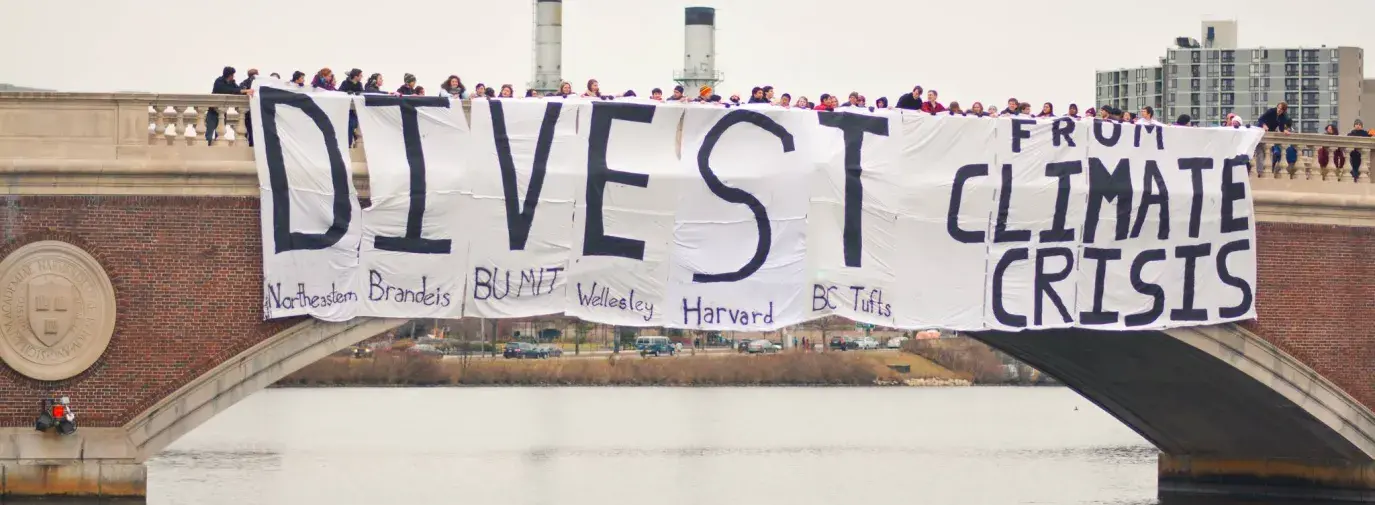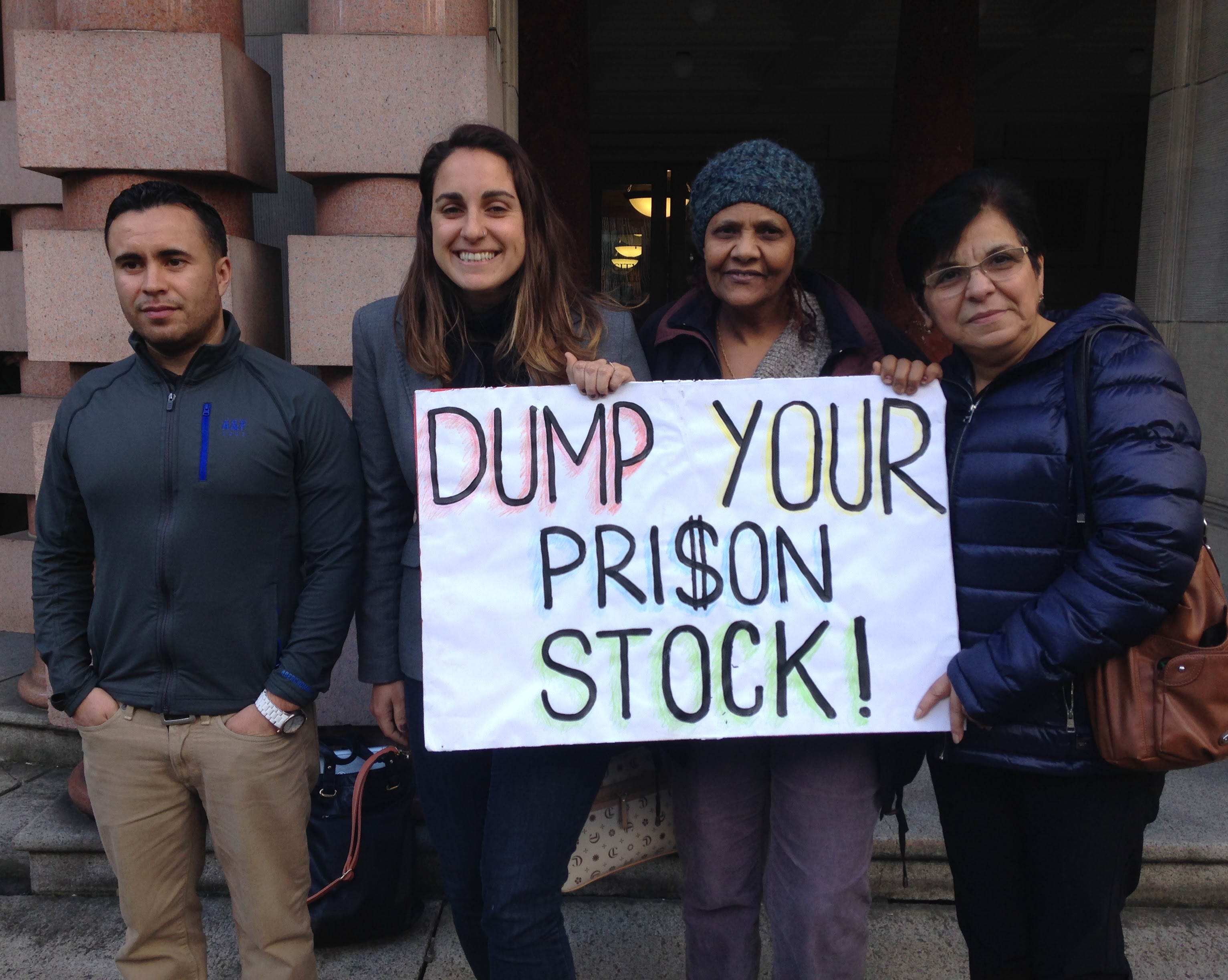
Since 2012, investor activists and college students have been advocating for divestment from fossil fuels, to send a market signal to the industry that investors and the public want it to stop warming the climate and start putting its resources into clean energy and other sustainable sectors.
The success of the fossil-fuel divestment movement (nearly $5.5. billion divested and counting) has spurred others to launch additional divestment campaigns. Investors turn to divestment when companies fail to respond adequately to screening, dialogues, and shareholder resolutions, in the hopes of piling pressure on problematic industries so they’ll improve:
- In the past year, the fossil-fuel divestors have specifically targeted banks helping to finance the Dakota Access Pipeline.
- They’re moving money out of the private prison industry.
- And they’re poised to divest from any company signing contracts to help build Trump’s border wall between the US and Mexico.
“Divestment is a powerful tool, as it generates ongoing bad publicity, communicates to companies that customers and shareholders want urgent change, and may even affect the financial bottom lines of laggards,”says Fran Teplitz, Green America’s executive co-director.
Fossil Fuels
The fossil-fuel industry has five times more carbon in its coal, oil, and gas reserves than experts think would be safe to burn, says bestselling author and 350.org founder Bill McKibben. To prevent their burning and the ensuing exacerbation of climate change, McKibben launched a campaign to get investors around the world—starting with colleges and universities—to divest from the top 200 publicly traded fossil-fuel companies.
Simultaneously, Green America’s Fossil-Free campaign is asking people to reinvest the money they pull out of fossil fuels into sustainable sectors like clean energy and more.
“If we divest and reinvest this way, there is indeed hope that we can create a clean-energy future,” says Teplitz.
As of June 2017, 732 institutions representing over $5.45 trillion in assets, and more than 58,000 individuals with about $5.2 billion in assets have made some sort of divestment commitment.
Notably, in 2015, Bank of America pledged to reduce its credit exposure over time to the coal-mining sector globally, citing pressure from universities and environmental groups as a key driver of its policy shift.
California passed a bill in late 2015 requiring its state public employees’ and state teachers’ retirement systems to divest from companies that get at least half of their revenue from coal.
In March of 2017, Columbia University became the latest higher-education institution to divest from companies that derive 35 percent or more of revenue from coal production.
Even mainstream investment companies are getting in on the act. In April 2017, AXA Investment Managers divested over 99 percent of its €717 billion ($805 billion) assets from fossil fuels.
“We strongly believe that divesting from coal can help to de-risk portfolios over the long term by decreasing exposure to assets that are likely to become stranded in the future as the world moves to be in line with the +2°C scenario,” CEO Andrea Rossi said in a statement, referring to the general agreement that the world cannot afford for global temperatures to rise 2°C above pre-industrial levels.
[Editor’s note: Developing nations say that two degrees is a death sentence for them and have been pushing for carbon reductions that keep world temperatures from rising above 1.5°C. Green America supports this threshold.]
If you’re worried that divesting from fossil fuels might negatively impact your portfolio, consider studies from the past few years that indicate otherwise: “Investors who have dumped holdings in fossil-fuel companies have outperformed those that remain invested in coal, oil, and gas over the past five years,” trumpeted the Guardian in April 2015.
Citing figures from stock market index company MSCI, the Guardian noted that “investors who divested from fossil-fuel companies would have earned an average return of 13% a year since 2010, compared to the 11.8%-a-year return earned by conventional investors.”
More recently, a study conducted by Aperio Group in 2016 estimated that a portfolio excluding all fossil-fuel companies from 1988 through 2013, a 25-year period, would have very little impact on investment risk. The fossil-free portfolio outperformed its benchmark by a fraction of a percent (0.05).
In other words, you don’t have to sacrifice performance to go fossil-free with your investments.
Visit greenamerica.org/fossilfree/ for a list of resources to help you divest from fossil fuels and reinvest in sustainability, including fossil-free mutual funds, CDs, and other vehicles, as well as financial advisors who can help clients construct fossil-free portfolios.
Dakota Access Pipeline
Activists on site at the Standing Rock Sioux camp protesting the Dakota Access Pipeline in 2016. Photo by Alex Hamer.
In July 2016, the Army Corps of Engineers approved construction on the Dakota Access Pipeline (DAPL), a massive oil pipeline that would stretch 1,172 miles from North Dakota, through South Dakota and Iowa, to Illinois. A project of Energy Transfer Partners, Enbridge Energy, Partners and Marathon Petroleum, the DAPL would carry 570,000 barrels of crude oil per day.
Nearly 40 mega-banks are providing financing for the DAPL, including JP Morgan Chase, Bank of America, Wells Fargo, and others. Activists are calling on individuals around the world to break up with their DAPL-supporting mega-banks. To date, investors have committed to pulling more than $4.4 billion out of these banks over the pipeline.
In April, anti-DAPL activists celebrated a major victory when US Bank announced at its annual shareholder meeting that it was pulling out of financing all oil and gas pipelines.
And in June, in response to a lawsuit filed by the Standing Rock Sioux, a federal judge ruled that the federal permits authorizing the pipeline to cross the Missouri River violated the law because they did not “adequately consider the impacts of an oil spill on fishing rights, hunting rights, or environmental justice, or the degree to which the pipeline’s effects are likely to be highly controversial,” according to EarthJustice. The court had requested additional information to consider whether to shut down the pipeline as this guide went to press.
The DAPL is a bad deal on several fronts: It encourages extraction of dirty, climate-warming fossil fuels. A spill could wreak havoc on local ecosystems and pollute the nearby Missouri River, which provides drinking water to 2.5 million people. And there’s a major environmental-justice component here, too: The Standing Rock Sioux reservation lies half a mile from the pipeline route, and the DAPL will run through traditional Sioux territory.
Adding grievous insult to this long-standing injury, the pipeline is also slated be built over areas that are sacred to the Sioux, including burial sites.
“This is a major victory for the Tribe, and we commend the courts for upholding the law and doing the right thing,” said Standing Rock Sioux chairman Dave Archambault II in a statement after the court victory. “The previous administration painstakingly considered the impacts of this pipeline, and President Trump hastily dismissed these careful environmental considerations in favor of political and personal interests. We applaud the courts for protecting our laws and regulations from undue political influence and will ask the Court to shut down pipeline operations immediately.”
In early June, the Tribe won the inaugural Henry A. Wallace Award for their courage and leadership in fighting off the DAPL. In addition to a $250,000 prize, the Standing Rock Sioux will also get a $1 million investment to ramp up wind- and solar-energy projects in their communities.
View the full list of DAPL-supporting banks here.
For tools and resources to help you break up with your mega-bank, visit Green America’s BreakUpWithYourMegaBank.org.
Green America is mobilizing our members with a campaign action targeting multiple banks. To add your voice, visit greenam.org/DAPLaction.
Read our article by Indigenous economist Rebecca Adamson on other ways to invest to support Standing Rock.
Private Prisons

Investor activists from Enlace urge people to divest from private prisons.Photo courtesy of Enlace.
Private prisons profit from the separation of families, human-rights violations, and inhumane conditions, according to Enlace, a racial- and economic-justice nonprofit. As part of its work toward criminal-justice reform, Enlace is urging people to divest from private prisons.
Rather than working on prevention or rehabilitation, private prisons have a “profit incentive that makes them work very hard to increase the number of people in prison and increase the length of time those people serve,” says Jamie Trinkle, Enlace’s prison-divestment campaign coordinator.
For example, private prison companies have helped draft and promote legislation that increases sentencing, such as mandatory minimum sentences for certain offenses and truth-in-sentencing laws that abolish the ability to earn parole.
Plus, when incarceration is about profit, private companies cut corners to increase earnings, which results in a lack of prison staff training, poor medical and psychological attention to people in prison, human-rights abuses such as overcrowding and substandard conditions, and a lack of services that enable the integration of people who have been incarcerated back into society, according to Enlace.
In addition, says Trinkle, “numerous reports exist that show how horribly private prisons treat prisoners, treat their staff. But one of the biggest concerns is that private prisons are a significant drivers of mass incarceration that particularly targets communities of color and immigrants.”
For example, communities of color suffer disproportionately from overly harsh penalties for drug and immigration offenses, which benefit private prisons.
Also, the Trump administration’s increased focus on rounding up undocumented immigrants further benefits the prison industry. Even immigrants who were trying to follow past rules, like minors who had been allowed to reside in the US under the DREAM Act, have been arrested or deported under Trump.
“Trump’s rhetoric is all about criminalizing immigrants—throwing them out of country or throwing them in prison behind bars,” says Trinkle. “As a result, immigrants, especially Black and Brown immigrants, are ending up in prison without services [they require], so corporations can reap profits off of their exploitation. This process doesn’t improve quality of life for anyone besides a few extremely wealthy people. It just furthers a racist and xenophobic agenda.”
In the US, approximately 75 percent of the private-prison market is controlled by two companies: Corrections Corporation of America (CCA) and GEO Group. A report published in late 2016 by In the Public Interest found that six mega-banks are playing the largest role in financing the private prison industry: Wells Fargo, Bank of America, JP MorganChase, BNP Paribas, SunTrust, and US Bancorp.
Enlace is calling on investors to divest from CCA, GEO Group, and the banks that fund them. In addition, the group is urging divestment from what it calls the “Million Shares Club,” or 32 companies that each own over 1 million shares in CCA and GEO Group, including American Century, Ameriprise, State Street Corp., and Vanguard Group.
To date, more than $3.5 billion has been divested from private prisons and the companies that support them. The United Methodist Church Pension Fund, Columbia University, the University of California, New York City’s pension funds, and the cities of Seattle, Portland, Alameda, and Berkeley have divested from prisons since the campaigns launch. In addition, former Million Shares Club members Scopia, Hamlin Capital, and Makaira have fully divested from prisons following pressure from the campaign.
For divestment toolkits and other resources, visit enlaceintl.org. Find the list of “Million Shares Club” companies.
The Border Wall

Mexican and Muslim immigrants march in Detroit to protest Trump's immigration policies and plans for a US-Mexico border wall.
A cornerstone of Trump’s presidential campaign was his plan for a large wall sitting on the US-Mexico border, to keep undocumented immigrants from crossing into the US. As one of his first acts upon taking office, Trump signed an executive order calling for construction to begin on the border wall, which opponents say would be too expensive to be practical, in addition to promoting hate. The Department of Homeland Security estimates the wall will cost $21.6 billion, with other sources saying it could cost twice that much. And the Mexican government has said that, contrary to what Trump promised on the campaign trail, it is most definitely not going to foot the bill.
While the federal government is still choosing among the more than 600 companies that bid on contracts to build the wall, lawmakers are already launching a movement to divest from those companies.
In June, the California State Senate approved a bill put forth by State Rep. Ricardo Lara (D-CA), which would prevent businesses working on the US-Mexico border wall from entering into or renewing a contract with the state of California.
“Senate Bill 30 sends a clear message that we want our businesses to stand with us and support our core values,” said Sen. Lara in a statement. “... President Trump’s wall will be a multi-billion-dollar boondoggle dragging down California’s economy, hurting our environment, and separating our communities—without making us any safer.”
The bill will now move to the State Assembly, where signs are promising for passage.
The Assembly has introduced its own bill related to the wall. AB 946 would give the state’s public employee and teacher retirement systems one year to divest from companies working on the wall.
Lawmakers in several states, including New York, Arizona, Illinois, and Rhode Island, are following in California’s footsteps, introducing similar bills that would penalize border-wall companies.
In addition, several cities are getting into the act. Oakland and Berkeley have passed laws forbidding companies working on the border wall from bidding on city contracts. In March, the San Francisco City Council introduced a measure that would do the same.
And organizations working for social and environmental responsibility, including Green America, stand ready to call for divestment from and a boycott of all companies with ties to the border wall.
“Institutional and individual investors have used divestment before to get companies to change their practices on human rights issues,” says Todd Larsen, Green America’s executive co-director. “Any companies involved in building a border wall with Mexico will face a rising chorus of investors calling for those companies to walk away from this human rights and environmental disaster.”







